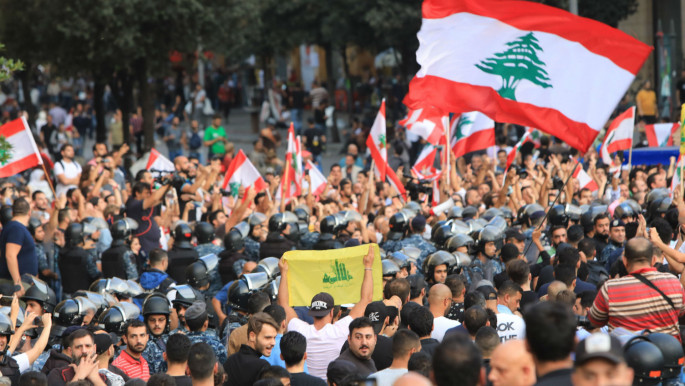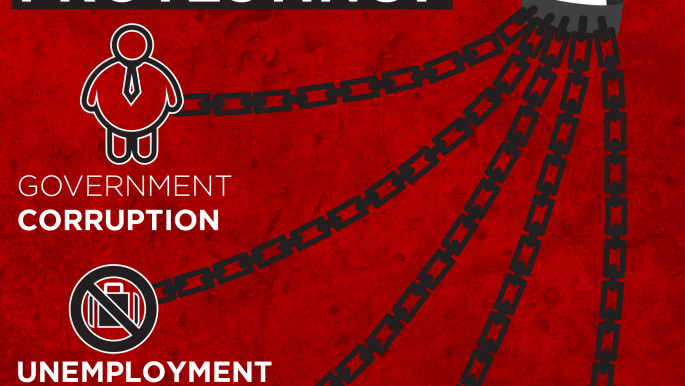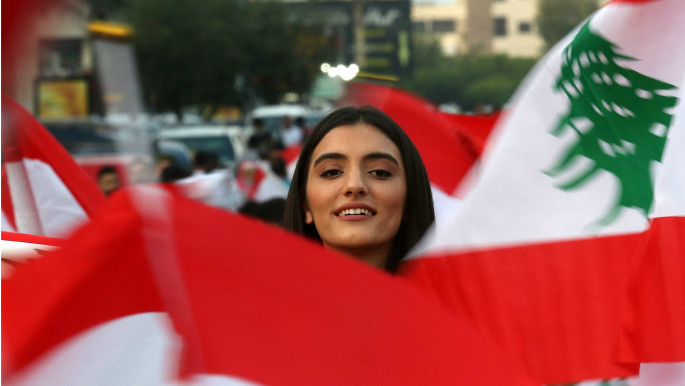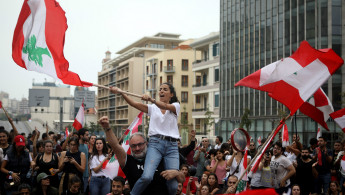Violent scuffles mar peaceful protests in Beirut
Violent scuffles mar peaceful protests in Beirut
Last Friday saw violent scuffles at Riad al-Solh Square, in central Beirut, after a group of Hezbollah supporters attacked protesters chanting slogans against Nasrallah amid anti-corruption protests in Lebanon.
7 min read
Lebanese protesters wave national flags during an anti-government demonstration in Beirut [Getty]
Friday's clashes between Hezbollah supporters and anti-government protesters in central Beirut were one in various reports of violence in the largely peaceful protests in Lebanon that have been marred by use of brutal force by more than one side.
Last Friday saw violent scuffles at Riad al-Solh Square, in central Beirut, after a group of Hezbollah supporters attacked protesters chanting slogans against Nasrallah amid anti-corruption protests in Lebanon.
The clashes took place when partisans of the powerful Iranian-backed Shia group entered the square, centre of the uprising in the Lebanese capital, where they imposed supportive chants of Hezbollah threatening and intimidating protesters against voicing any criticism of their leader Hassan Nasrallah.
Demonstrators chanted "All them means all of them", a popular slogan since the protests started on October 17 meaning their intent to hold everyone in power accountable for Lebanon's problems, including Nasrallah who has been equated by the rallying crowds as one among other corrupt politicians who must go.
"Nasrallah is more honourable than all of them," pro-Hezbollah supporters chanted about government leaders accused of corruption by the protest movement.
 |
|
| Read also: No longer on the fence: Hezbollah endorses the counter-revolution of the corrupt Lebanese ruling class |
Lea Mroweh, a Lebanese activist who prefers not using her real name for security concerns, said it is unclear who are those young men (or "thugs") attacking peaceful demonstrators, and she cannot "dissect" their motives for such violence.
The activist, who has joined the anti-government rallies every day, clarified that, while the base of Hezbollah does not oppose the ongoing protests, they don't want the influential militant group to fall.
"I think many of those sympathisers have some kind of love and respect for their leader. They're not talking about dismantling the group," Mroweh noted.
Firas, a Lebanese militant and filmmaker, shared similar thoughts: "Those siding with Hezbollah are trying to safeguard the honour of Nasrallah who many perceive as a religious figure, not just a politician."
When talking about the violence on Friday, he stressed the need to specify that the men who aggressed protesters were not members of Hezbollah nor an organised group, but "proxy supporters."
 |
I think many of those sympathisers have some kind of love and respect for their leader. They're not talking about dismantling the group |  |
A Hezbollah official told local media that the party denounced the violence in Riad al-Solh Square, however Nasrallah's silence on the actions of his partisans angered protesters.
The confrontations came just an hour before the head of the powerful group spoke in a televised address in which he nominally expressed support for the protest movement, however suggested that the revolt is being funded by foreign powers and warned that the fall of the government could push the country into "chaos".
He opposed calls for the government to resign and hold early elections, saying the economic situation was too fragile. Instead, he called on the street movement to answer the president's invitation for a dialogue to end the crisis that has paralysed the country, and finally urged his group's supporters to leave the streets.
Read more: Radical reform or total chaos for Lebanon?
Read more: Radical reform or total chaos for Lebanon?
On the same day, partisans of the Christian Free Patriotic Movement (FPM), founded by President Michel Aoun, rallied outside the Palace of Justice and tried to convince dissidents that they shared the same goals with slogans such as "Your demands are the same as the FPM's" and "President Aoun is not corrupt. Focus on others".
 |
|
In his first address to the nation since the protests began, Aoun invited protesters to name their representatives and open a dialogue. The president vowed to tackle corruption but stated the streets were no place to bring down the government. He also hinted that a government reshuffle was an option.
The address was met with disappointment on the streets where many see him and the whole political elite as part of the problem, not the solution.
Although a lot of media attention went to Friday's violent confrontations stirred by a group of Hezbollah supporters in downtown Beirut, violence has been perpetrated by multiple sides throughout the nationwide protests.
On Friday too, standoffs between Lebanese security forces and anti-government protesters turned violent in the southern Beirut neighbourhood of Furn al-Shebbak, where protesters had set up a highway roadblock. Some demonstrators diffused videos of the Lebanese army attacking people and telling them to clear the road.
On the second day of the revolts, Lebanese forces used excessive force against protesters in central Beirut with the Internal Security Force (ISF)'s riot police and army firing tear gas and rubber bullets at a peaceful crowd, chasing people and beating them to clear the area. At least 70 individuals were arrested on October 18 though activists estimated the total to be close to 300.
There have been several reports of aggression by riot police and the army against demonstrators in the capital and different parts of the country including the military forcibly removing people to prevent them from blocking main roads in Beirut and its suburbs, and in the cities of Sidon and Tyre in southern Lebanon.
Confrontations have occurred between protesters and different party supporters. Last week, few dozens of people were injured in the southern city of Nabatieh after coming under attack from gunmen believed to be associated with the Shia Amal movement, led by Speaker of Parliament Nabih Berri.
Read more: The time has come to define the Lebanon we want
In some areas of the south, in the early days of the unrest, armed thugs allegedly affiliated with Amal aggressed protesters and attempted to clear blocked roads by force.
In recent days, loyalists of both Hezbollah and the FPM party have increased their presence on the streets sparking clashes with demonstrators.
"The violence being practiced against demonstrators by party members/supporters (FPM, Amal, Hezbollah etc) over the past days is a dirty yet expected tactic to halt protests and create an environment of fear. Protesters must remain defiant," Jimmy Matar, a research officer in Middle Eastern politics tweeted days ago.
 |
|
| Read also: Revolutionaries, not 'babes': Lebanon's women protesters call out sexist Arab men for objectifying them |
Hinting at Nasrallah's speech, which he deemed mostly "condescending," Firas indicated that warnings over "vacuum" or a "civil war" made by the powerful leader equalled to a scare tactic.
"One of the main tactics our politicians have used for the past several years is emotional blackmail to give us the illusion that either we go down their path or we're headed towards a much worse fate," the activist stated, "but people are no longer buying into this."
Mroweh felt disheartened at the public address which she said "played on people's fears," expressing concern that it might make people more hesitant to join the protests since many perceived the speech as a threat.
"It [the speech] made us realise that the road is going to be tough, the government isn't going to step down without a fight, but people are determined to carry on with the movement, they think they can't live in this way anymore."
For Diala Chehade, lawyer and defender of civil liberties, Nasrallah's discourse was "extremely hypocrite and manipulative."
She said that, if on one hand the Shia group's leader referred to protesters as "non-politicised" and "independent", on the other one he claimed that the majority of the protesters are associated with "vicious parties" and funded by "Western embassies."
She said that, if on one hand the Shia group's leader referred to protesters as "non-politicised" and "independent", on the other one he claimed that the majority of the protesters are associated with "vicious parties" and funded by "Western embassies."
Chehade observed that many in the streets became reluctant about resuming to rally, fearing for their safety, while many others were motivated to further protest.
Hundreds of thousands have taken to the streets every day since October 17 in countrywide protests triggered by a proposed tax on messaging apps such as WhatsApp, which was quickly retracted after public anger broke out, then turned into street mobilisation against the entire political system seen as corrupt and broken.
Largely leaderless and bringing together people from across sectarian lines, the demonstrations have been overwhelmingly peaceful blocking roadways, and closing schools and banks across the country for days.
Despite the government's zero-tax reform plan presented by PM Saad Hariri last week that included cutting minister salaries has failed to defuse popular anger, the rallies have continued to demand doing away with the country's sectarian government.
Alessandra Bajec is a freelance journalist reporting from Lebanon and Tunisia.
Follow her on Twitter: @AlessandraBajec



